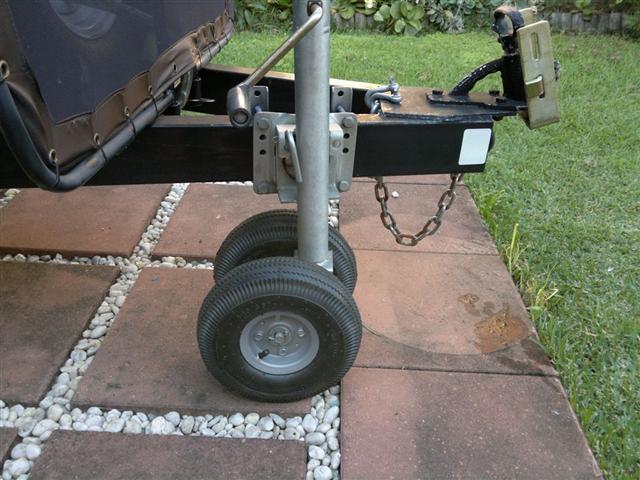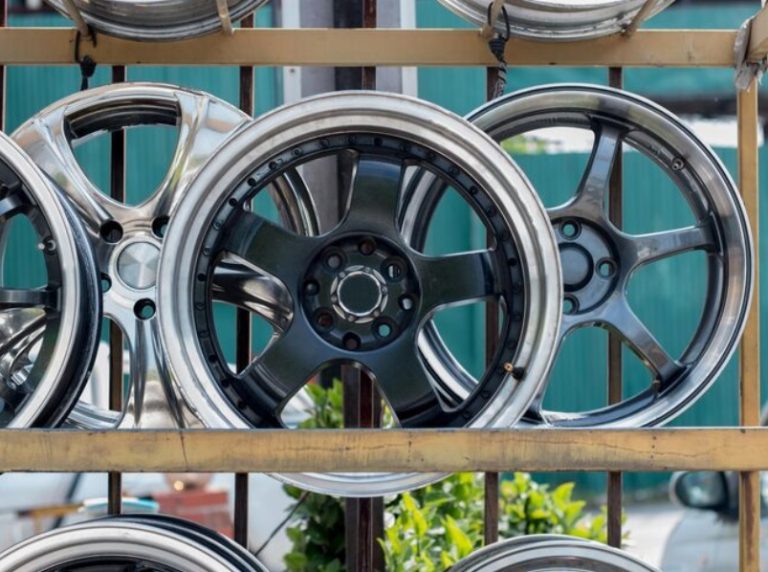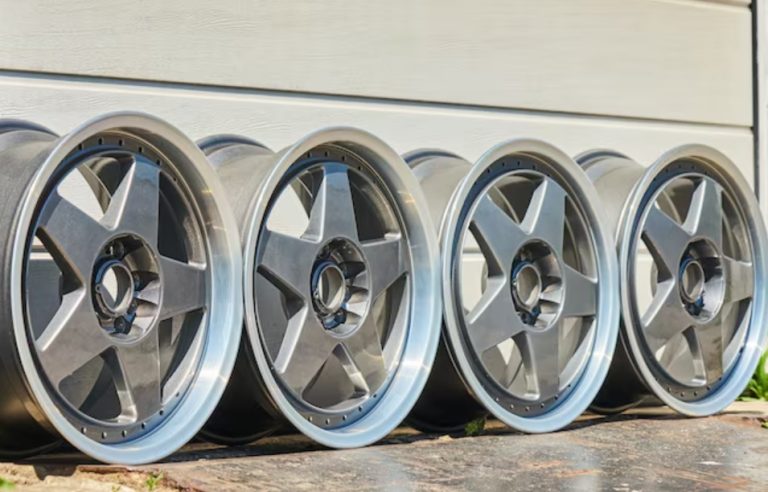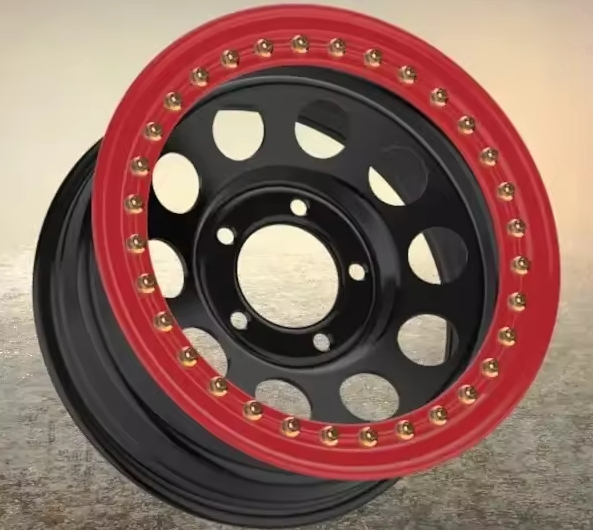Before we get into the gritty of adjusting the tension on the jockey wheel lets first touch on the basics of what a jockey wheel really is all about. If you’re just stepping into the world of trailers you might be curious as to what role this little wheel plays and why it holds significance. In essence a jockey wheel serves as a support feature that is fixed to the part of a trailer or caravan. Its primary purpose is to simplify your tasks by assisting in maneuvering and steadying your trailer particularly when its not connected to a vehicle.
What is a Jockey Wheel for Trailer?
When towing a trailer without the assistance of a jockey wheel or caster wheel as its sometimes known as in towing circles can be quite challenging and unsafe for the user due to the lack of support provided by this vital component when the trailer is not connected to a vehicle; such a wheel may seem ordinary but plays a significant role in ensuring safety and ease during towing operations by distributing weight effectively and preventing damage to the hitch mechanism caused by excessive pressure on it. You can utilize it to steer your trailer through spots effectively or make precise turns while also adjusting the trailers height as needed. It’s crucial to select the jockey wheel type and install it properly to improve maneuverability stability and safety for your towing.
The Importance of Proper Jockey Wheel Tension
After grasping the fundamentals of a jockey wheel, purpose and functionality is important to consider why its tension plays a role in its performance quality and overall safety.
The Role of a Jockey Wheel
The jockey wheel serves a role beyond just being a wheel – it acts as a key support point to maintain the balance and maneuverability of your trailer effectively at all times. By preventing any tipping movements during loading/unloading and while parked up a stable foundation is ensured. This allows for hassle loading/unloading operations without concerns about instability. Additionally, it aids in guiding the trailer into narrow spaces and simplifies the hitching and unhitching processes. The jockey wheel makes it easier for you to raise or lower the trailer hitch without needing to exert much physical effort.It plays a role in ensuring that your towing activities are carried out safely and smoothly.
Consequences of Incorrect Tension
Our sources may not directly mention the outcomes of having tension in place; however they do emphasize the significance of a well fitted and operational jockey wheel component. Should your jockey wheel be improperly installed it could result in mishaps trailer harm or even detachment from the vehicle. Moreover surpassing the weight limit of the jockey wheel may lead to instability and damage. A malfunctioning jockey wheel could also result in noise and vibration during towing. Ensuring that your bicycles jockey wheel is functioning properly is crucial for a journey ahead.
Identifying the Right Tension for Your Jockey Wheel
Knowing the kinds of pulley wheels and their unique requirements can help guarantee that you make the most of this basic yet essential device. It’s crucial to take into account aspects such as the trailers weight the kind of terrain you’ll face and the level of maneuverability required.
Types of Jockey Wheels and Their Tension Needs
There are kinds of jockey wheels tailored for specific scenarios. Solid jockey wheels with a rubber or plastic wheel ideal for lighter loads and smooth surfaces; pneumatic jockey wheels featuring an air filled wheel suited for rough terrains due to its shock absorbing properties; and swivel jockey wheels equipped with a mechanism for effortless navigation in confined areas. Even though the references do not explicitly outline tension requirements for each variant mentioned above it remains crucial to select the suitable type based on your specific needs.
Factors Affecting Optimal Tension
Having the right size wheel that can handle the weight is crucial for your jockey wheel to function properly! Bigger wheels are more effective on surfaces and ensure your trailers weight is well supported to avoid any harm or damage caused by the pressure exerted on it. Additionally, using top quality materials, like metals and durable plastics can help prevent corrosion issues. When you grasp these aspects thoroughly, you’ll be assured that your jockey wheel will operate smoothly and securely according to your requirements.
Recognizing Signs of Improper Tension
Our resources may not provide guidance on identifying indicators of incorrect tension levels; however they stress the importance of ensuring that a well fitted jockey wheel functions smoothly. If your jockey wheel is not performing optimally, you may observe sounds or vibrations and encounter challenges when maneuvering your trailer. Regularly inspecting your jockey wheel for any signs of damage such as cracks or rust is advisable to maintain its functionality.
Adjusting Your Jockey Wheel
Lets now dive into the steps for tuning your jockey wheel to make sure its working at its best performance level! Initially, it may appear a bit intimidating. By staying patient and having the necessary tools on hand, this task can be carried out in a clear and simple manner.
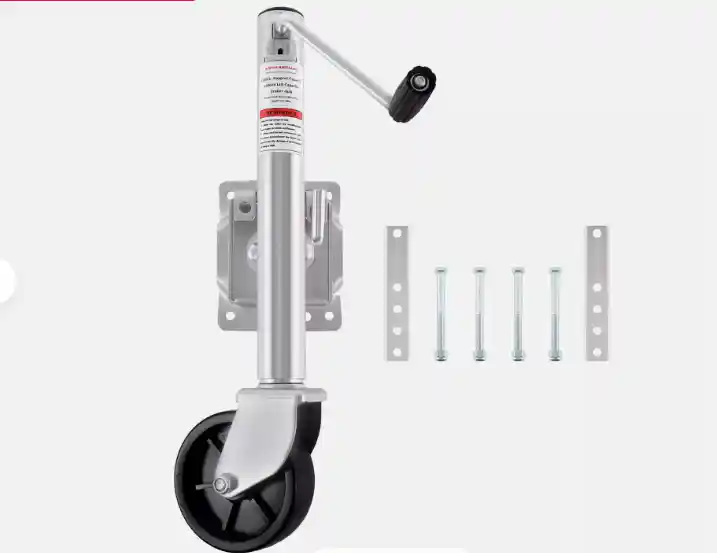
Tools You Might Need
When setting up your jockey wheel for use on your vehicle or trailer hitch assembly, it’s advisable to have some tools at the ready. Bolts and screws will be necessary for securing the mounting bracket in place. Additionally, using a lubricant is vital to ensure that the jockey wheel operates smoothly without any issues. By having these tools readily available you can streamline the adjustment process.
Step-by-Step Guide to Tension Adjustment
Though our guides offer guidance on setting up a jockey wheel yet they lack details on adjusting the tension.The fundamental steps for installation are as follows:
- Securing the mounting bracket to the trailers drawbar or a
- Securing the mounting bracket onto the trailer frame.
- Placing the jockey wheel assembly onto the mounting bracket.
- Ensuring that the jockey wheel assembly is properly secured with the mechanisms.
- Changing the height and space of the jockey wheel.
Safety Tips During Adjustment
Before making any adjustments to the jockey wheel be sure to follow some safety precautions ! Secure the trailer wheels with a block to prevent any movements and ensure that the trailer is on level ground for optimal jockey wheel performance placement wise! It’s crucial to position the jockey wheel in a way that evenly distributes weight and doesn’t cause any interference with trailer components.
Maintaining Your Jockey Wheel
Ensuring that your jockey wheel receives maintenance is vital for prolong its lifespan and keeping it functioning effectively. Regular inspections and appropriate upkeep are essential to prevent issues and guarantee journeys.
Regular Inspection
Make sure to check your jockey wheel for any indications of wear and tear such as cracks or rust on the wheel itself or its bracket and mounting hardware components.This practice can assist in spotting problems early on to prevent them from escalating into significant concerns.
Lubrication
Ensuring your jockey wheel operates smoothly requires lubrication for its moving parts, like the swivel and height adjustment mechanisms – a simple but essential maintenance step to keep it functioning effectively over time.
When to Seek Professional Help
If you see anything problematic while inspecting your trailer it’s important to deal with it right away. You can always seek assistance from a professional if you’re unsure of how to solve the issue to ensure that the necessary repairs or replacements are carried out properly.This will maintain the safety and readiness of your trailer.
Go Trailer: Your Reliable Jockey Wheel Supplier
If you’re looking to purchase a jockey wheel you might want to check out Go Trailer. A reputable trailer parts company located in Qingdao, China. With than 15 years of industry expertise they focus on top notch trailer components. Go Trailer utilizes cutting edge manufacturing facilities such as CNC machines, drilling machines, saws, mills and laser cutters to maintain production standards. Additionally, they provide jockey wheels for selection:
- Jockey wheels that can handle a payload of 1200 to 2000 pounds and sway on the side.
- The rated sailboat wheels can carry a maximum weight of 1200 to 2000 pounds.
- European designed pulley systems with a carrying capacity of 300 pounds.
- Trailer jack stands rated for a weight capacity of 1200 pounds.
- Swivel trailer jacks that can be welded on supporting a weight of 2000 pounds.
- Trailer jacks that can handle a weight of 12,000 pounds and can swivel.
- Electric trailer jockey wheels that can handle up to 498 kilograms in weight.
- Trailer jacks with two sets of wheels that can carry up to 2000 pounds.
- Wheel casters equipped to stop and can support up to 1200 pounds in weight.
At Go Trailers core are a dedication to safety and quality well as a commitment to honest business practices. You can steer clear of complications. Cut costs by purchasing straight from the source – the manufacturer. Their offerings cater to clients across the U.S., Australia, Europe and beyond.
FAQs
Q: What is a jockey wheel used for?
When a trailer or caravan is not connected to a vehicle, a jockey wheel—a wheel installed at the front—is used for tasks like moving, parking, hooking and unhooking and storing the trailer. It plays a role in keeping the trailer stable and upright to avoid tipping over.
Q: How do I know if my jockey wheel is the right size for my trailer?
When choosing a jockey wheel it’s important to take into account the weight of your trailer and ensure that the load capacity of the jockey wheel is equal to or greater than the weight of the trailer itself. Additionally, it’s an idea to factor in the type of terrain where you’ll be using the trailer when deciding on the jockey wheel that best suits your needs.
Q: How often should I lubricate my jockey wheel?
Remember to apply lubricant to the moving components of your jockey wheel, like the swivel and height adjustment features to keep them running smoothly and efficiently based on how frequently you utilize the trailer and the prevailing weather conditions.


